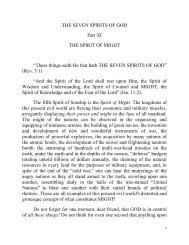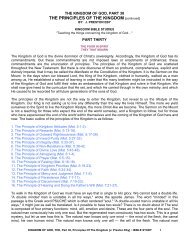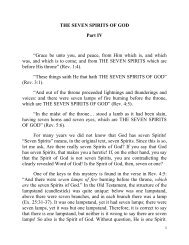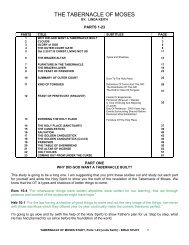Song of the Bride, Parts 1-34 - Feasting at the King's Table
Song of the Bride, Parts 1-34 - Feasting at the King's Table
Song of the Bride, Parts 1-34 - Feasting at the King's Table
Create successful ePaper yourself
Turn your PDF publications into a flip-book with our unique Google optimized e-Paper software.
The anointing oil is a symbol <strong>of</strong> <strong>the</strong> baptism <strong>of</strong> <strong>the</strong> Holy Spirit. With <strong>the</strong> Aaronic priesthood, none could minister<br />
before <strong>the</strong> Lord before <strong>the</strong> blood and <strong>the</strong> oil were applied. The holy anointing oil could not be put upon flesh,<br />
but only upon <strong>the</strong> priests, after <strong>the</strong> blood was applied. We see th<strong>at</strong> it is God’s will for all who have been<br />
redeemed by <strong>the</strong> Blood <strong>of</strong> Jesus, and desire to serve God in any way, to be filled with <strong>the</strong> Spirit. Jesus forbade<br />
His disciples to depart from Jerusalem until <strong>the</strong>y had received <strong>the</strong> Holy Spirit. We must be careful not to<br />
despise <strong>the</strong> oil (<strong>the</strong> Holy Spirit), claiming th<strong>at</strong> if we are saved ad trusting in <strong>the</strong> Blood <strong>of</strong> Christ, <strong>the</strong> baptism in<br />
<strong>the</strong> Holy Spirit is not necessary. This is Christ’s gift to His bride whom He purchased with His own precious<br />
Blood.<br />
It is <strong>the</strong> fragrance <strong>of</strong> His oil upon us th<strong>at</strong> delights Him and fills Him with joy. (He counts it even gre<strong>at</strong>er than <strong>the</strong><br />
fragrance <strong>of</strong> all manner <strong>of</strong> spices!) And, as we smell <strong>the</strong>se odors upon one ano<strong>the</strong>r, we are refreshed and<br />
uplifted in spirit by <strong>the</strong>ir fragrance.<br />
PART TWENTY-SEVEN<br />
Newsletter No. 202 – May 2004<br />
<strong>Song</strong> <strong>of</strong> Solomon 4:11, “Thy lips, O my spouse, drop (as) <strong>the</strong> honeycomb: honey and milk are under thy<br />
tongue; and <strong>the</strong> smell <strong>of</strong> thy garments is like <strong>the</strong> smell <strong>of</strong> Lebanon.”<br />
Honey stands for th<strong>at</strong> which streng<strong>the</strong>ns weakness, and milk builds up <strong>the</strong> young and tender. So plentiful is <strong>the</strong><br />
bride’s store th<strong>at</strong> she is ever ready to distribute to those in need. Her lips do not pour out <strong>the</strong> honey—<strong>the</strong>y drop<br />
it, a little <strong>at</strong> a time, as a person is able to bear it. Her heart is full and her measure <strong>of</strong> nourishment is so gre<strong>at</strong><br />
th<strong>at</strong> she must guard herself against pouring overmuch into a needy vessel. She needs to observe <strong>the</strong> law for<br />
drinking wine given in Es<strong>the</strong>r 1:8, “And <strong>the</strong> drinking was according to <strong>the</strong> law; none did compel… <strong>the</strong>y should<br />
do according to every man’s pleasure.”<br />
Standing in contrast to <strong>the</strong> lips <strong>of</strong> <strong>the</strong> bride are <strong>the</strong> lips <strong>of</strong> <strong>the</strong> wicked. “Their thro<strong>at</strong> is an open sepulchre; with<br />
<strong>the</strong>ir tongue <strong>the</strong>y have used deceit; <strong>the</strong> poison <strong>of</strong> asps is under <strong>the</strong>ir lips.” We have seen th<strong>at</strong> <strong>the</strong> only way <strong>the</strong><br />
lips and tongue can be cleansed is to have <strong>the</strong> fountain cleansed. When a branch from <strong>the</strong> tree <strong>of</strong> Life is cast<br />
into this fountain, <strong>the</strong> heart is made clean and <strong>the</strong> words are also changed. This was how <strong>the</strong> bitter w<strong>at</strong>ers<br />
were healed in <strong>the</strong> wilderness—by cutting down <strong>the</strong> branch <strong>of</strong> a tree and putting it into <strong>the</strong> w<strong>at</strong>er (a type <strong>of</strong><br />
Christ and His passion). When <strong>the</strong> Word <strong>of</strong> God enters <strong>the</strong> heart, <strong>the</strong> bitterness is changed to honey, and <strong>the</strong><br />
poison to milk.<br />
Under <strong>the</strong> bride’s tongue are words <strong>of</strong> comfort and sweetness th<strong>at</strong> give grace to <strong>the</strong> hearer. They are hidden<br />
away to be brought forth as <strong>the</strong> occasion demands.<br />
“And <strong>the</strong> smell <strong>of</strong> thy garments is like <strong>the</strong> smell <strong>of</strong> Lebanon.” Garments speak <strong>of</strong> all th<strong>at</strong> has to do with our<br />
external appearance, just as clo<strong>the</strong>s are <strong>the</strong> covering <strong>of</strong> <strong>the</strong> body and are easily noticed by o<strong>the</strong>rs. Our<br />
<strong>at</strong>titudes such as behavior, actions, social pleasures, and good manners are clearly seen by all. The bride’s<br />
outward appearance and <strong>at</strong>titudes indic<strong>at</strong>e th<strong>at</strong> she is walking in <strong>the</strong> spiritual elev<strong>at</strong>ion represented by<br />
Lebanon (whiteness). Because she walks with <strong>the</strong> Lord, she carries <strong>the</strong> fragrance <strong>of</strong> His presence. I’m sure<br />
you have experienced strangers smiling <strong>at</strong> you or greeting you because <strong>the</strong>y smell this fragrance, even though<br />
<strong>the</strong>y may not understand from whence it comes.<br />
4:12, “A garden shut up, (is) My sister, My bride; a spring shut up, a fountain sealed.” In <strong>the</strong> Hebrew, <strong>the</strong> word<br />
“is” is omitted, making a distinction between <strong>the</strong> bride and <strong>the</strong> garden. After God cre<strong>at</strong>ed <strong>the</strong> universe and<br />
man, He planted a Garden. Its purpose was not for mere agricultural use, nor for commercial produce. Its only<br />
objective was for flowers and fruitfulness. It was not a public domain, but a priv<strong>at</strong>e place <strong>of</strong> growth.<br />
In this figur<strong>at</strong>ive language we see th<strong>at</strong> <strong>the</strong> maiden has now come to a place where she is <strong>of</strong> delight and<br />
s<strong>at</strong>isfaction to <strong>the</strong> Lord. She now realizes th<strong>at</strong> she doesn’t exist simply for her own pleasure, to live her life as<br />
she sees fit, but she lives for <strong>the</strong> pleasure and s<strong>at</strong>isfaction <strong>of</strong> her <strong>Bride</strong>groom. “A garden enclosed”, or fenced<br />
in, signifies her high calling. She is not in a public garden; she is “<strong>the</strong> planting <strong>of</strong> <strong>the</strong> Lord, th<strong>at</strong> He might be<br />
SONG OF THE BRIDE, <strong>Parts</strong> 1–<strong>34</strong> [Elaine Cook] ~ BIBLE STUDY 38


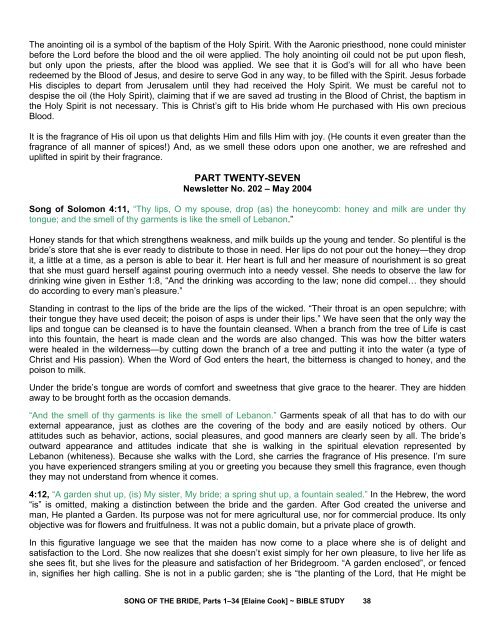
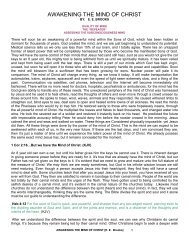
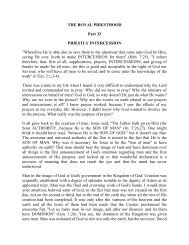
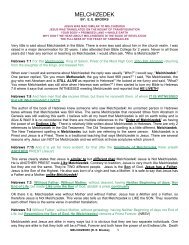
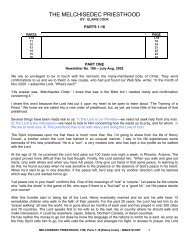
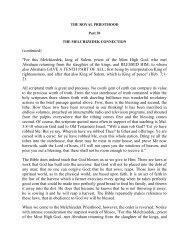
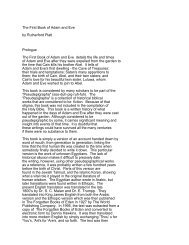
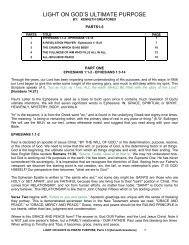
![WOOD AND STONE â THE STORY OF KING CAIN [EE Brooks]](https://img.yumpu.com/31019666/1/190x245/wood-and-stone-a-the-story-of-king-cain-ee-brooks.jpg?quality=85)
